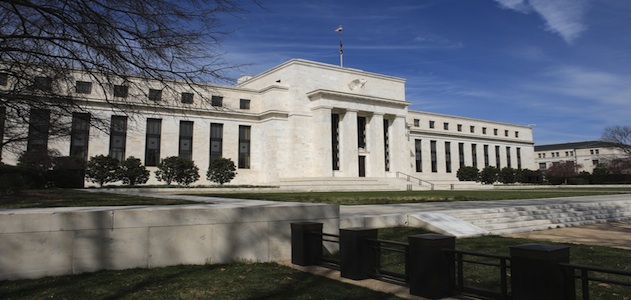With President Obama facing a laundry list of Congressional battles on multiple fronts, including the debt ceiling debate, Syria and the federal budget, the idea of having to fight a divided Congress to appoint Larry Summers as the next Fed Chair may have proven too much.
Former U.S. Treasury secretary Larry Summers removed his name from consideration to replace Ben Bernanke as Fed chair following a stream of opposition from policymakers, most notably, Sen. Jon Tester, D-MT, according to Compass Point. Sen. Elizabeth Warren, D-Mass., also submitted a belated admission in the press saying she was unlikely to green light a Summers appointment.
While Summers was being considered, most Republicans were content to stand on the sidelines and let Senate Democrats duke it out. However, with his name off the list, the market expects some Republicans to shift the debate towards a discussion about the Fed’s quantitative easing program.
"The opposition of liberal-leaning Senators such as Senators Merkley (D-OR) and Brown (D-OH) is one thing, but losing a comparatively moderate lawmaker like Sen. Tester undoubtedly changed the White House calculus underpinning this decision," explained Compass Point financial analyst Isaac Boltansky.
The markets viewed Summers withdrawal as a positive given that he was viewed as more hawkish on policies, particularly the central bank’s bond-buying program when compared to Fed vice chairman Janet Yellen, said FBR Capital Markets managing director Paul Miller.
"The 10-year Treasury note is down 10 bits today, and what the market is saying is Yellen clearly has the position and is going to be less aggressive on tapering the Fed’s monetary policy," Miller said.
Pricing of Treasurys rose, driving yields on the 10-year note to the lowest level in August. The benchmark 10-year Treasury note rose 25/32 in pricing, yielding 2.803%.
While the market is now unquestionably rooting for Yellen, the White House is still a bit apprehensive to take bets off other possible nominations.
Industry experts note the issue at hand is political concerns that the President could appear forced into Yellen’s nomination, feeding into a narrative of weak leadership.
"This could provide an opening for another candidate to emerge, especially as Democrats would have a difficult time bucking a second candidate," said FBR Capital Markets financial advisor Ed Mills.
On a similar note, Compass Point analysts believe that Yellen will become the nominee due to both her experience and her easy path to confirmation.
However, they caution that it’s premature for the Fed vice chairman to start moving her belongings into Bernanke’s office.
"Yellen remains the frontrunner and out pick for the Federal Reserve chairmanship, but we do not believe that Summers’ withdraw alone seals Yellen’s nomination," Bolktansky said.
There are a number of other names to be aware of, including former Fed vice chairman Don Kohn, former chairman of Teachers Insurance and Annuity Association – College Retirement Equities Fund; Roger Ferguson and former Treasury economic policy assistant secretary Alan Krueger, Compass Point noted.
Investors are sensitive to who takes over the central bank, given that the market expects the Fed to begin or plan out the eventual scaling back of its ultra-easy bond-buying program in the Federal Open Market Committee’s monthly meeting this week.
Bernanke has buoyed a wide range of asset purchases, most notably mortgage-backed securities to secure the housing market.
Talks of scaling back MBS and other asset purchase have led to sharp market volatility since May, when rates began to increase dramatically.
Although Summers’ withdrawal from the Fed chairman nomination will not persuade the impact on the upcoming FOMC meeting this week, it has confirmed speculation that a nomination by Obama as to who will oversee the Federal Reserve will not be decided until later on this year.
"While the White House could announce its Federal Reserve Chair nominee at any point in the coming days we believe that it will likely wait until after the conclusion of the upcoming FOMC meeting and debate over the budget expiration is resolved. Complications in the calendar increase the likelihood that the White House will not make its Federal Reserve nominations until early October," Boltansky concluded.





